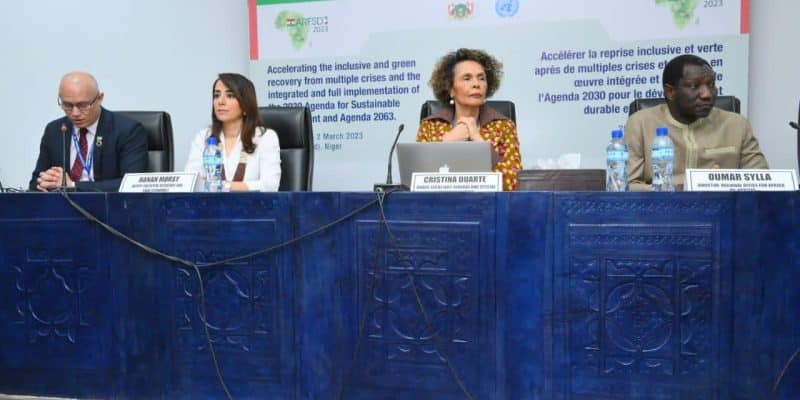Cobalt is an essential mineral for the manufacture of batteries and electric vehicles. The DRC and Zambia, which together account for almost 80% of the world's cobalt reserves, have decided to set up an African value chain for the production of batteries and electric vehicles. Part of the partnership is to tap into a market that will be worth about $46 billion by 2050. This project was the focus of a conference held on 26 February 2023 in Niamey, Niger, as a prelude to the ninth session of the African Regional Forum for Sustainable Development (ARDF-9).
At the Africa Business Forum in Kinshasa on 24-25 November 2021, a BloombergNEF representative presented a study showing that the Democratic Republic of Congo (DRC) could exploit its cobalt reserves to become a cost-competitive and CO2 emission-competitive producer of battery cathode precursor materials. The study also found that investment costs in the DRC were lower than in any of the other major battery producing countries, due to their relatively low project development costs, even after taking into account infrastructure, labour and other costs.
The opportunity for the DRC lies in the fact that the country alone has 70% of the world’s cobalt reserves. This mineral is essential for the manufacture of electric batteries. To seize this opportunity, the DRC has joined forces with Zambia, which has 10% of the world’s cobalt reserves. The two countries aim to create an African value chain for the minerals used to make batteries.
Read also-AFRICA: Niamey hosts the 9th African Forum on Sustainable Development in February
The two states are being supported by development partners such as the African Export-Import Bank (Afreximbank) and the African Economic Commission (AEC). For the UN body, the project should benefit the entire continent. “The minerals involved in the value chain for the production of batteries and electric vehicles are present in all African countries. And to move to the production of electric vehicles, we need African countries that already have the expertise in this area, including South Africa, Morocco, Kenya, and Rwanda,” explains Antonio Pedro, ECA’s Acting Executive Secretary.
The project feasibility study
ECA, AfreximBank and a consortium of partners are working directly with the DRC and Zambia to establish a value chain for battery minerals.
A feasibility study of the project to create an African regional value chain for minerals used in the manufacture of batteries and electric vehicles will be launched in the coming days by the ECA. The study will, among other things, estimate the cost of the project as well as the source of funding, define the legal and policy framework for the activity and analyse African expertise in the field.
This feasibility study will add to the progress already made by the DRC and Zambia, notably the establishment of a cooperation framework for the development of electric batteries, the creation of an African Centre of Excellence on Batteries (ACEB), and the establishment of the DRC-Zambia Battery Council.
A market worth around $46 billion
The stakes of an African value chain for the minerals needed to manufacture electric batteries are colossal. Over the next 25 years, the market for electric batteries should reach 46 billion dollars. The stakes are also ecological, given that cobalt is also used in the manufacture of solar panels and wind farms. This would be a boon for a continent like Africa, where nearly 600 million people have no access to electricity, according to the World Bank.
Boris Ngounou






